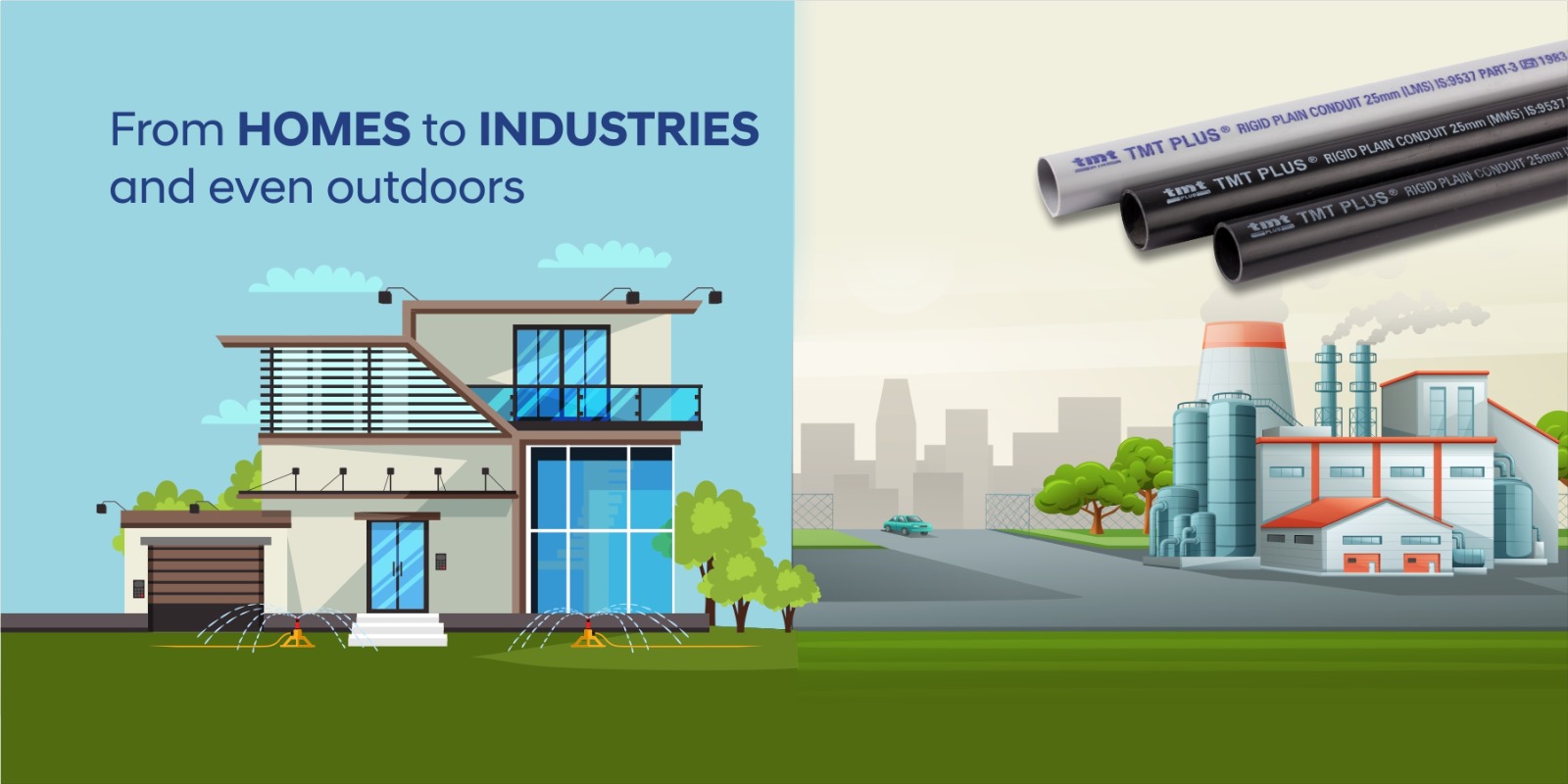From homes to industries and even outdoors
Electrical wiring is one of the most crucial aspects of modern infrastructure, not visible when the work is done but its layers and system are there, weaving through our homes, offices and industrial spaces, powering our lives.
It’s behind the seamless integration of electrical systems that a crucial component is placed: the conduit. Electrical conduits provide a protective pathway for wires, safeguarding them from environmental hazards and ensuring safety and reliability. Among the various materials used for conduits, unplasticized polyvinyl chloride (uPVC) stands out for its exceptional properties and versatility.
Let’s showcase the diverse applications of PVC electrical conduit pipe in electrical wiring
Different applications of uPVC conduit:
- Residential wiring: In residential buildings, uPVC conduit is extensively used for concealing electrical wires within walls, floors and ceilings. The durability and ease of installation make it an ideal choice for both new construction projects and renovation works.
- Commercial buildings: From offices to retail spaces, uPVC conduit finds wide applications in commercial buildings, where it facilitates the safe and organized routing of electrical cables. The fire-resistant properties contribute to building safety standards, ensuring compliance with regulations.
- Industrial facilities: In industrial environments, where electrical systems are subjected to demanding conditions, PVC electrical conduit provides reliable protection against mechanical damage, moisture and chemical exposure. It is commonly employed in manufacturing plants, warehouses and processing facilities.
- Outdoor installations: uPVC conduit is also suitable for outdoor installations, such as street lighting, landscape lighting and underground wiring. Conduit’s resistance to weathering and UV degradation makes it a preferred choice for outdoor electrical applications.
- Infrastructure projects: Infrastructure projects, including bridges, tunnels and transportation networks, often rely on uPVC conduit for powering lighting, communication systems and surveillance equipment. The properties such as durability and versatility ensure uninterrupted functionality in critical infrastructure installations.
- Data centres: In data centres, where reliability is paramount, uPVC conduit provides a protective conduit for electrical and networking cables. The fire-resistant and chemical-resistant properties enhance the safety and security of sensitive data processing environments.
Explore its noteworthy features.
Features of uPVC conduit:
- Durability: uPVC conduit is renowned for its robustness and longevity. Resistant to corrosion, rust, and degradation from UV exposure, it ensures the integrity of electrical installations even in harsh environments.
- Flexibility: Despite its rigidity, the uPVC conduit offers flexibility, allowing for easy bending and routing around obstacles. This flexibility simplifies installation, especially in complex structures where straight runs may be impractical.
- Fire resistance: uPVC is inherently fire-resistant, offering enhanced safety in case of electrical faults or external fires. Its low flammability and self-extinguishing properties make it a preferred choice for fire-sensitive applications.
- Chemical resistance: uPVC conduit exhibits excellent resistance to a wide range of chemicals, including acids, alkalis, and solvents. This property is particularly advantageous in industrial settings where exposure to corrosive substances is common.
- Smooth interior surface: The smooth interior surface of the uPVC conduit minimizes friction during cable pulling, reducing the risk of damage to wires and simplifying installation procedures.
- Cost-effectiveness: uPVC conduit offers a cost-effective solution for electrical wiring, providing a balance between performance, durability and affordability. The long service life comes with the added advantage of hardly any need for maintenance and saves on replacement costs over time.
In conclusion, uPVC conduit emerges as a versatile solution for various applications in electrical wiring. Whether in residential, commercial, industrial, or infrastructure settings, uPVC conduit ensures the safe and efficient distribution of electrical power, contributing to the seamless functioning of modern societies.
Consider PVC conduit pipe from TMT Plus, which is one of the leading brands for uPVC conduit. They also offer a variety of fittings like bends and PVC junction boxes that go perfectly with the conduit pipes. The remarkable features such as durability, fire resistance and chemical resistance, make it an indispensable component of electrical installations worldwide. As technology advances and infrastructure evolves, uPVC conduit will continue to play a vital role in powering the future.
